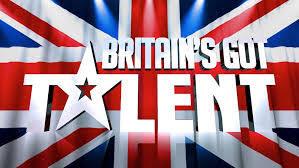
Brexit Countdown: The "Has Britain Got Talent?" Edition
Traders got back from a long weekend in London earlier today after May Day celebrations and spring festivals.

Source: Wikimedia
Dancing around a
May-pole with the May Queen with flowers in your hair and such tradition
derives from the pagan Anglo-Saxon customs held during "Þrimilci-mōnaþ"
which is the Old English name for the month of May meaning - Month of
Three Milkings ( Perhaps, like in May 2015, a seasonal set up for a
"Triple-top" in GBP/USD before June and an EU referendum in Britain?)
...
Bad jokes aside, something I just discovered today, is that
May 1, 1707, was the day when the Act of Union came into effect, joining
England and Scotland to form the Kingdom of Great Britain.
Coincidently, I wrote on May 1st, published yesterday, about the count down to the EU referendum in Britain and touched on the 2014 Scottish referendum - spooky hey?! ... Anyway ...
So,
for today, I want to look at the EU referendum more closely this month,
just as I am sure that British investors and business owners will be,
having returned to their portfolios after the May Day celebrations,
perhaps a little bit dizzy still after all that traditional dancing
around a May-pole on plenty of country ale no doubt, and will have
started to co-ordinate themselves accordingly in respect to the possible
outcomes of how a Brexit will affect their portfolios and businesses.
Short GBP positions reduced

For us FX addicts, it is certainly time to
either get involved or simply stay on the sidelines while we still try
to decide how to position ourselves in the FX space. And by the way,
albeit, in my opinion, too soon to really have much of a bias, but
looking at the most recent CFTC data, it looks like the 'remain' camp
are swaying the market to get less short of GBP positions. So let's look
at this...
Should Britain stay in the EU?
Well,
the country will decide on 23rd June. It is a question that has been in
debate over the last decade and the pros and cons are a very close call,
depending who you are of course. It is indeed very complex and it is
nothing that one could expect conclusions to be drawn from within a
single and relatively short article ... so bear with me...
On the
surface of the debate, from a social perspective, free borders are a
hot issues for the British public in respect of security and terrorism,
migrant workers and clashing cultures where as at the other end of the
spectrum, campaigners are looking at the financial advantages of EU
membership for Britain, trade and investment. Then, the bigger picture
is all about Britain's place in the world.
Let's take this a step
at a time and for today, I want to look at the affect of international
workers and see if we can draw any conclusions of how a Brexit would
impact Britain's workforce.
Immigration
Let's look at Immigration - "Cheap, underpaid migrants who have "come over here to take our jobs."
Within
the confines of EU law, the U.K. cannot prevent anyone from another
member state coming to live in the country. The number of foreign-born
people of working age in the UK increased from 2.9 million in 1993 to
6.6 million in 2014. I have not been able to find a reliable number for
2015 I'm afraid.
However, I recall from when living in the U.K.
that there was a significant jump in the number of foreign-born workers
in the UK during 2006, which coincides with the opening of UK labour
markets to workers from the A8 countries (Czech Republic, Estonia,
Latvia, Lithuania, Hungary, Poland, Slovakia, and Slovenia) in mid-2004.
Trying
not to generalize here and to be as politically correct as possible,
the views shared between 'certain groups' on migrant workers in the UK
tend to come up time and time again and the negative focus has been on
the A8 nations in particular.
Moonlighting..."There
was a time I used to be able to clear seven and a half, eight hundred
shots a
week.... Not any more. Nah....Now we are Moonlighting..."

Source: YouTube
For instance, you
might be able to talk to, say, five out of ten local tradesman in
London, a chippy (wood craftsman), a bricky (bricklayer) a cabby (taxi
driver), and they will tell you how fed up they are with one rule for
them and another rule for a foreigner who has moved to the U.K. to find
work and can receive better employment services and benefits for their
entire family than a born and bread British labourer. In the case of
this London cabby, he was not amused that he needed to now work around
the clock in order to make is previous wage, AKA "moonlighting".
Lazy Brits...

Source: Express
However, on the
other hand, you might talk to, say five out of ten business owners, and
they will tell you how much better workers migrants are and if it wasn't
for foreign national workers, their businesses would not have survived
the 2007 recession.
'All my restaurants would close without
European immigrants ... who are prepared to work long hours in hot
kitchens,' - Jamie Oliver, who is a British celebrity chef.
Romania's
outspoken Minister for Labour, Maria Campeanu, famously argued that
"The UK should be grateful for hard-working foreigners who, far from
stealing jobs, are filling positions shunned by lazy, workshy Britons
who prefer to live off benefits."
Inners (voting to stay in the
EU) say that, while they acknowledge the recent pace of immigration has
caused some difficulties with social housing and provisions of
services, the net effect has been overwhelmingly positive. David
Cameron, UK Prime Minster and an Inner, argued that the concessions he
managed to pick-up during the renegotiation of Britain's EU membership
will reduce immigration as new arrivals will receive a lower rate of
child benefit.
In respect to wages themselves, Stuart Rose, who
was once Marks&Spencer chief executive and known for his pro-EU
campaigning, admitted recently that wages may actually rise if Britain
were to exit. This, on one hand, would be good for UK workers,
(especially the lazy ones), but less so for their employers.
But,
just imagine if the U.K. did lose all those jobs applied to foreign
workers. It might mean more jobs for the people who remained, if they
were not too lazy to get off the couch and benefits to actually go out
there and fill the vacancies in the first place, because labour
shortages could also hold back the British economy, reducing its
potential for growth.
Overall, the affect of leaving the EU on
British jobs is complex in the factors in trade, investment and
immigration. However, something that strikes me the most, Professor
Adrian Favell, who was writing for the London School of Economics,
argued that shutting out EU nations and limiting the freedom of movement
around the EU would deter the "brightest and the best" of the continent
from coming to Britain and will reduce the pool of candidates employers
can choose from.
Britain's got talent, but got its own internal borders to cross first...

Source: Mirror UK
My personal opinion on this matter, is that should the 'outers' have it, access to education will be critical for Britain's future and casting my mind back to the London riots of 2011 remind me of the social divide that exits in Britain.

Source: The Guardian
Britain does
have talent and a lot of it, but what it lacks is absolute accessibility
to education and training, depending what side of the social fence you
are on, and that is one of the greatest risks, in my humble opinion, of
leaving the EU and I asked whether the nation is set up for a Brexit yet
and to go it alone? Does it have the right skill set and home-bread
talent to do so?
I see that there is still too much of a social
divide within itself and if you are to go it alone, you better have a
strong core of young talent coming through - so the borders within
Britain's own social classes within its own self need to come down
first.
GBP/USD getting smashed

Meanwhile, sterling is making big moves in
recent markets, getting smashed some more in the U.S. shift today on
more profit taking post the big miss earlier in U.K. manufacturing PMI
49.2 vs. 51.2 ... I will be turning to open position monitoring in
futures and options to get a handle on this one, post the NFP's this
week as next major risk factor to cable.


